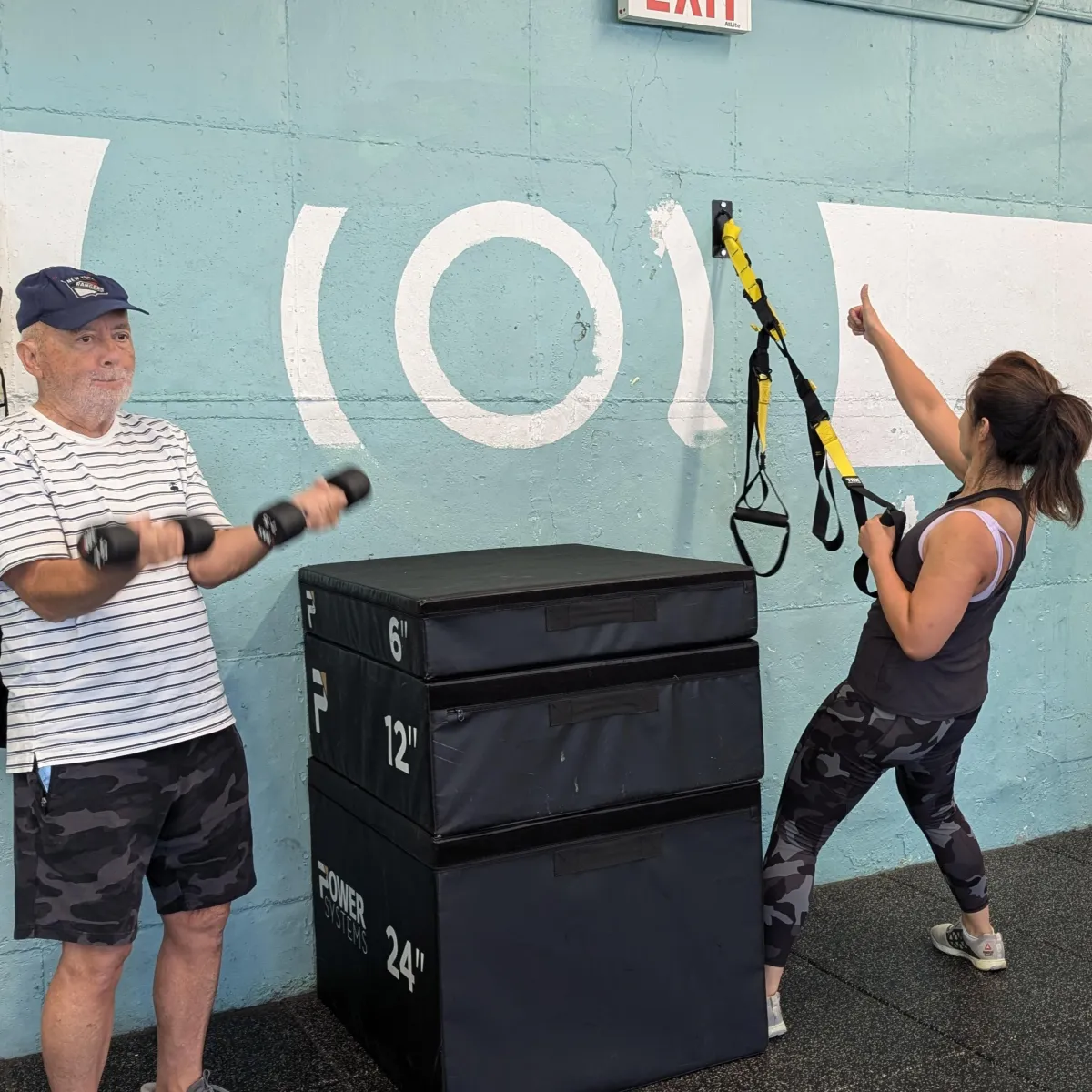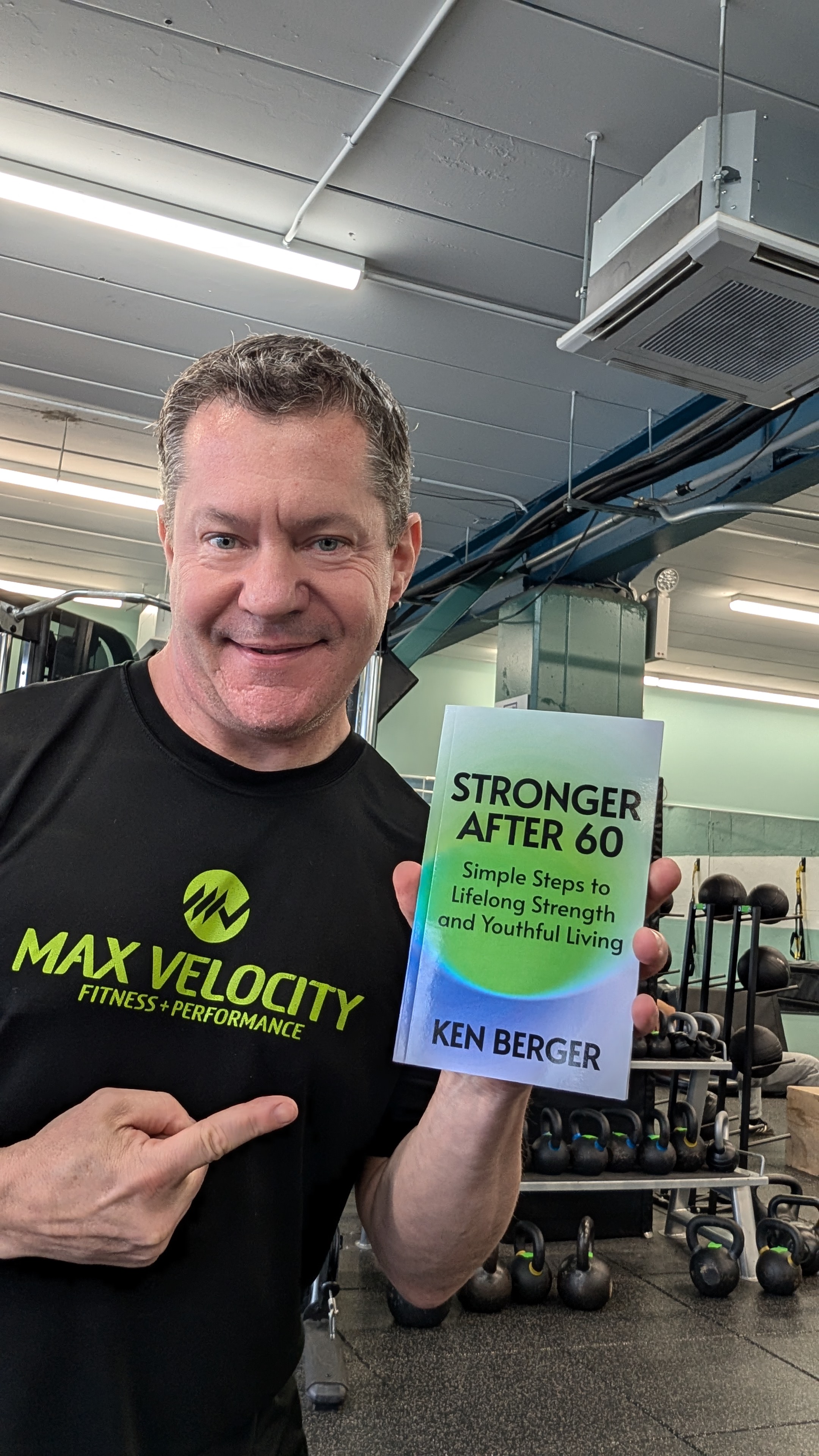

Antidote to Aging: Strength Training As Your Defense Against Father Time
By Ken Berger
You wake up one morning, and it hits you. Your knees creak as you get out of bed. The thought of your weekly tennis match fills you with dread instead of excitement. And as you try to remember your to-do list for the day, your mind feels foggy and slow.
This is Sarah's reality at 54. She'd always been active and sharp, but lately, she feels like she’s losing her edge. Her joints ache after a short walk. The idea of hiking with friends seems impossible. And more often than not, she finds herself searching for words that used to come easily.
"Is this what getting old feels like?" Sarah wonders. She desperately wants to feel young, vibrant and healthy again. But how?

Sarah's not alone. Many of us hit a point where we start to feel the effects of aging. We slow down, get achy and lose some of our mental sharpness. It can be frustrating and even a little scary.
But here's the good news: It doesn't have to be this way. There's a powerful tool that can help you fight back against the effects of aging. It's not a magic pill or a miracle cure. It's something much simpler and more effective: Strength training.
Now, you might be thinking, "Strength training? Isn't that just for bodybuilders and athletes?" Not at all. Strength training can be a game-changer for anyone, especially as you get older. Let's dive into why it's so powerful and how it can help you feel young again.
Why Strength Training Matters
As you age, your body changes. You might notice you're not as strong as you used to be. That's because you naturally lose muscle mass as you get older. But here's the good news: You can fight back.
Strength training isn't just about building big muscles. It's about keeping your body functioning at its best. When you lift weights or use resistance bands, you're doing more than just working out. You're investing in your health.
Muscle Matters

Let's talk about muscle mass. It's not just for show. Having strong muscles helps you in everyday life. It makes carrying groceries easier. It helps you climb stairs without getting winded. And it can even prevent falls.
But there's more. Muscles aren't just for moving. They play a big role in your overall health. They help control your blood sugar and keep your metabolism running smoothly. So when you build muscle, you're not just getting stronger. You're setting yourself up for better health overall.
Bones and Balance
Your bones need a workout too. As you age, your bones can become weaker and more brittle. This puts you at risk for fractures. But strength training can help.

When you lift weights, you're not just working your muscles. You're also putting good stress on your bones. This stress encourages your bones to get stronger. It's like telling your body, "Hey, we need strong bones here!"
And let's not forget about balance. Good balance helps prevent falls, which can be serious as we age. Strength training improves your balance by working the muscles that keep you steady on your feet.
Fighting Disease
Now, here's where things get really interesting. Strength training isn't just about muscles and bones. It's a powerful tool in fighting disease.
When you strength train, you're helping your body in ways you can't see. You're improving your insulin sensitivity. This means your body can better manage blood sugar, which is great news for preventing or managing type-2 diabetes.
You're also reducing inflammation in your body. This might not sound exciting, but it's a big deal. Chronic inflammation is linked to all sorts of health problems, from heart disease to cancer.
And speaking of heart disease, strength training is good for your circulatory system too. It can help lower your blood pressure and improve your overall cardiovascular health.
Weight Management
Let's talk about weight for a moment. As we age, keeping a healthy weight can become more challenging. But strength training can help.
When you build muscle, you're boosting your metabolism. Muscle tissue burns more calories than fat tissue, even when you're resting. So by adding muscle, you're turning your body into a more efficient calorie-burning machine.
This doesn't mean you'll lose weight overnight. But combined with a healthy diet, strength training can help you achieve and maintain a healthy weight. And that's important for preventing a whole host of health problems.
Sure, when you were younger, you may have wanted to lose weight so you could have a skinny waist and 6-pack, or look better in your bathing suit. In your 50s, you now realize that maintaining a healthy weight has far more important repercussions.
Brain Boost
Here's something you might not expect: Strength training is good for your brain too. It's true! When you participate in vigorous exercise, your body produces something called brain-derived neurotrophic factor (BDNF).

BDNF is like fertilizer for your brain. It helps repair damaged brain neurons and even build new ones. This is huge for keeping your mind sharp as you age.
Studies have shown that strength training can improve memory and cognitive function. It can even help protect against neurodegenerative diseases like Alzheimer's and other forms of dementia.
And let's not forget about mood. Strength training is a powerful mood booster. It can help fight depression and anxiety, leaving you feeling happier and more confident.
Getting Started
So, how do you get started with strength training? It's easier than you might think.
The first step is to download my FREE Info Packet, so you can learn all about my strength training program, how it works and the results to expect. You’ll also discover the schedule and pricing, and get an invitation to a FREE 1x1 session with me!
Next, you’ll decide if it’s a good fit … and if it is, we’ll hop on a quick 10-minute phone call to map out a plan to achieve all your goals. There’s no risk and no obligation; just me helping your journey to a better quality of life.
Third, you’ll come in for your FREE 1x1 session so you can experience the benefits of my safe, effective strength training program for yourself!
You can get started by downloading my FREE Info Packet here.
With my expert guidance, you’ll start slowly and build up gradually. Consistency and proper form are more important than intensity, especially when you’re just getting started. Even small doses of strength training, done regularly, can make a life-changing difference in your health.
Take Action Today
Now that you've learned how strength training can benefit your health as you age, it's time to take action. Get started today by downloading my FREE Info Packet below.
Want To Learn More First? Download A FREE Copy Of My Best-Selling Book ... Stronger After 60!
My new best-selling book, Stronger After 60, is your ultimate guide to optimal health, fitness and longevity through the power of science and healthy habits.
Stronger After 60 will change the way you think about aging. This book is designed for real people who want simple solutions to maintain their strength and youthful energy while enjoying the best things in life without restriction. It’s your roadmap to longevity, wellness and enjoying your 60s and beyond like someone half your age.

And TODAY, You Can Get Your Very Own Copy of Stronger After 60 ... for FREE!
Just click the button below, fill out your info, and a copy of Stronger After 60
will be on its way to your inbox in seconds!
Don't miss out on this life-changing opportunity. Get your FREE copy of Stronger After 60 NOW.




